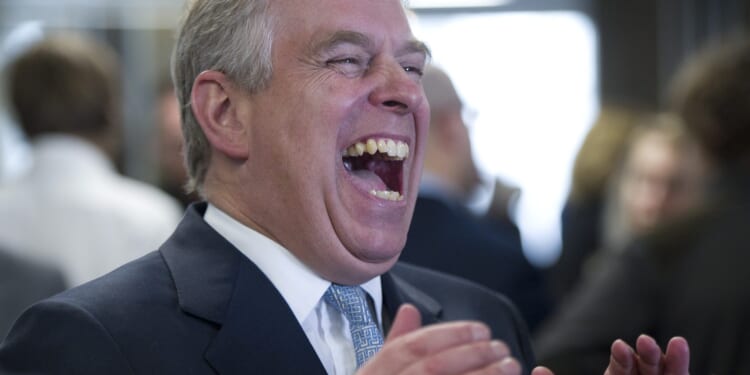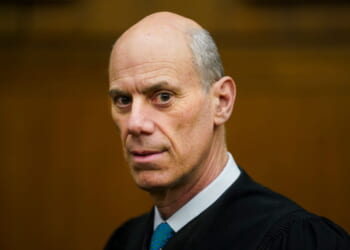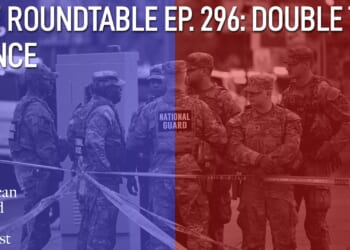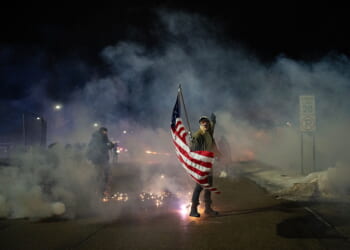The philosopher Hegel wrote that every historical event happens twice. Karl Marx commented that he forgot to add: the first time as tragedy, the second as farce. One of the notable aspects of the death of Prince Andrew, and the simultaneous birth of Andrew Mountbatten Windsor, is that it doesn’t even have the grand status of tragedy. While we can’t say that, to be sure, of the events which caused his fall from grace: the sexual exploitation of young women and girls, the suicide of at least one of these victims, the cynical abuse of what Ghislaine Maxwell called “trailer trash” by the over-rich and over-privileged. But Mr Mountbatten Windsor himself is far from the protagonist of a classical drama. As a species of upper-class buffoon, dim-witted, ruthlessly self-interested and with the moral hide of a rhinoceros, he is closer to the farce of which Marx speaks. In fact, it’s said that “buffoon” was a word regularly used of him by those with the ill luck to encounter him when he was a trade envoy. It’s not the most exact of terms: the Oxford English Dictionary defines it as “a ridiculous but amusing person” — so Andrew may be relieved to know that he’s a half-buffoon only.
Tragic figures who overreach themselves and come to nothing are traditionally said to fall prey to hubris: for the ancient Greeks excessive pride or self-assurance. Andrew was already an arrogant young puppy by the time he arrived at prep school, and later had his head swollen even further by being applauded for killing Argentinians. The result of hubris is nemesis, when someone or other cuts you savagely down to size. In Andrew’s case, the agents in question are too numerous to count, but they include one of the most courageous of his victims, his elder brother and — probably above all — himself.
Philosophically speaking, the Greeks were for the most part rationalists, but the tragedians among them knew that life didn’t work like that. Everyone was potentially guilty, not least the innocent. This was because the ancient Greeks saw guilt less as a subjective state than an objective affliction, rather like illness or pollution. Oedipus is a so-called guilty innocent: the fact that he never intended to kill his father, or have sex with his mother, is morally speaking neither here nor there. In fact, he never once justifies his actions by pleading ignorance, to the amazement of the modern mind.
If Andrew is far from a tragic figure, it isn’t only because he lacks the necessary dignity, but because tragic figures must evoke some kind of sympathy. Aristotle writes of tragedy as evoking in us both pity and fear: fear because the destruction of the hero reminds us of our own sickeningly fragile state, and pity because we need to have some sympathy for the protagonist if his plunge from a great height is to move us. You can’t be an Oedipus or a Hamlet if you’re mostly responsible for your own undoing, as is the case with Andrew Mountbatten Windsor.
Andrew doesn’t know very much. No doubt he has some knowledge of ships, horses and dubious commercial dealing, but like almost all of the rest of his family, he’s probably never read a book. This is another way in which he differs from certain classical tragic heroes, whose problem isn’t ignorance but an excess of knowledge. Take Sophocles’s Oedipus, for instance. He is one of the smartest of tragic heroes, not least because he solves the riddle of the Sphinx, by doing so saves his city from destruction. What he doesn’t know, however, is who he is, which is to say who his parents are.
This is also true of Andrew, who of course knows who his parents are but not what ought to follow from this knowledge. To be a prince is to know that you have enormous privilege, but also that you must play it down. You can only maintain it by being suitably discreet about it. In a democratic society, entitlement survives by seeking to conceal itself. The late Queen was said to be horrified by the retinue of cooks, footmen and multi-purpose lackeys that accompanied her eldest son when he descended on some unfortunate friend for a weekend party. She herself went around Buckingham Palace switching off lights to save electricity. If your elite status has no rational foundation whatsoever, but depends in the end on nothing more substantial than the approval of the common people, you don’t flaunt your luxurious lifestyle in ways likely to alienate them.
“To be truly upper-class, by contrast, is to be ignorant of class altogether.”
Instead, you keep in mind the fact that admiration and resentment, veneration and derision, lie cheek-by-jowl in the public mind. You have to make sovereignty look like service. You don’t make public visits to banks, unless they’re food banks. You don’t descend on the offices of transnational corporations but on old people’s homes. Andrew’s problem is that he never learnt this golden rule. Rude, bullying, pompous and infantile, he wasn’t only socially superior but actually behaved as though he was, which makes life uncomfortable for those close relations of his who are just as pampered as he — but have the nous to keep quiet about it. He once talked on television about “my first day at public school”, as though to remind us that he wasn’t sent to a back-street comprehensive. To be truly upper-class, by contrast, is to be ignorant of class altogether.
Oedipus does finally come to how little he knows. His search for his own origins leads him to uncover a monster which is no less than himself. At the root of his identity lie murder and incest, a darkness that no mere knowledge can dispel. As with Andrew, the revelation of a sexual transgression brings Oedipus low. In tragedy, you have to be careful what you do, because past events can breed calamitous consequences in the present. What you thought safely buried in the past can return to haunt you. Your own free actions can come to confront you as alien forces. Old ghosts refuse to lie quiet, but rise up to cry out for justice. In the face of this, the tragic protagonist must come to recognise just how frail and finite he is, and only then can he be redeemed.
Lear’s regal delusions run so deep that he has to be hauled through hell for them to be purged. “They told me I was everything”, cries the dethroned king, “’tis a lie — I am not ague-proof”. Caught in a storm, surrounded by fools and madmen, the lunatic monarch comes to acknowledge that he is not everything but nothing (“I am a very foolish fond old man”), and only in this act of self-knowledge can he become something. He has done grave harm to a young woman, his daughter Cordelia, but comes to repent of his crime and beg her forgiveness.
All this has a political dimension in the play. Knowing his own weakness allows Lear to feel solidarity with the dispossessed:
Take physic, pomp;
Expose thyself to feel what wretches feel…
So distribution should undo excess,
And each man have enough.
These are not words one imagines Andrew wakes up with on his lips, or indeed the Chancellor of the Exchequer. Shakespeare writes in Lear that the“superfluous and lust-dieted man” must have a change of heart and “shake the superflux” to the poor. Excessive wealth and privilege insulate the body from the afflictions of others. A superfluous and lust-dieted man isn’t a bad description of how some now view the former prince. There are those of us who believe that princes are superfluous anyway, so that the phrase “a superfluous prince” is as much a tautology as “business ethics” is an oxymoron; but Andrew has taken that to an extreme. He would now seem, frighteningly, to have absolutely no purpose in being around the place — to be surplus to the needs of humanity. That is indeed the kind of forlorn condition which might lend itself to tragedy. But there’s nothing tragic about justice. However futile his life from here on, he has got his comeuppance. His heart is still beating, which is more than can be said for Virginia Giuffre.
King Charles would no doubt be pained by the suggestion that the finest work of his beloved Bard might be read as promoting some kind of communism, or even social democracy. He once called me “that dreadful Terry Eagleton” because he thought that I didn’t venerate the Swan of Avon sufficiently. Even so, he would have done well to make the work required reading for his delinquent brother, alongside stripping him of his house and titles.

















